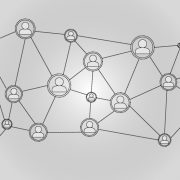Entrepreneurial order is the social system of self-organization that F.A. Hayek described, and we summarize in Center For Individual’s 10-point manifesto for individualism.
- Everyone follows his or her own individual conscience.
- All property is private property, so I know what’s mine and respect what’s yours.
- Everyone is free to try their best, to see what they can achieve.
- Each individual contribution is tested and corrected by others.
- No-one is qualified to pass final judgment on others’ capacities or what they can do.
- The remunerations of the efforts of the individual correspond to the value of the result of his or her effort to others.
A free market satisfies these conditions. In the market, the individual takes the risk to find out if the results of his or her efforts create value for others. Everyone does their best, and the preferences of consumers tell producers what to produce more of and less of.
Entrepreneurial order is decentralized and networked to distribute power, influence and opportunity among people who find each other. The new order does not depend on hierarchy, centralized institutions, or giant global corporations mass marketing, mass distributing, and mass adverting. It is dynamic and self-organizing.
Today, as a result of new technologies such as mobile devices for universal access, platforms and apps, both entrepreneur and customer have a universal network on which to find each other and respond to each other directly. There is more scope for peer-to-peer exchange: more speed, lower, transaction costs, and higher quality of continuous, direct communication.
The Three Technologies Of Entrepreneurial Order
The first type of new technology is those the augmentation of the capabilities of the individual via greater access to knowledge, learning and intelligence. This augmentation technology – sometimes called artificial intelligence – can be applied vertically within professions and occupations to make individuals smarter in their specialty, and horizontally across the agile attributes of individuals in multiple skills, collaboration and teaming. Entrepreneur and customer will both be augmented, enabling individualized and personal responsiveness.
The second type is disintermediation – people serving people better, faster and at lower cost by cutting out middlemen, back rooms and intermediate process steps and replacing these with peer-to-peer exchange. Blockchain is the leading emergent technology here. It promises a big advance for service systems, eliminating the bias and discrimination of mediators such as banks and financial institutions.
The third type is represented by global market exchange platforms, where multiple parties on multiple sides of a platform can exchange, create and collaborate.
New Organizational Forms, New Entrepreneurial Styles.
These new technologies will change how we organize business and society. A new form of augmented self-reliance will emerge, as will new forms of social and economic structures, such as boundary-less commercial organizations and functionally independent political structures, such as prosperity zones.
A new definition of entrepreneurship will also emerge. The new entrepreneurship lies in interconnecting people, knowledge, technology, ideas and actions so that new innovations emerge. It is the interconnecting that constitutes entrepreneurship.
Research conducted by Dr Cristina Mele and Dr. Tiziana Russo Spena (both of University of Naples Federico II, Department of Economics, Management and Institutions, Napoli, Italy)[1] points to interconnectedness as the opening of a door to an emergent and entirely new and revolutionary concept of economic, social and cultural innovation.
Entrepreneurs Co-create and Co-construct.
Entrepreneurship becomes the continuous co-construction and co-creation that results from the interconnections among a network of market actors, actions, contexts and resources. Innovation is the emergent outcome: “a shared knowing and doing” of society. Innovation is about interactions between networks of actors, a set of collaborative practices taking place on nested, interconnected networks. The next great phase of innovation is interconnecting humans and non-humans in new ways to build new innovation opportunities. There is no predicting the new experiences that will emerge.
Importantly, entrepreneurship and innovation are no longer merely business issues. Entrepreneurs will change everything: socially, culturally, material and contextually. The shared knowing and doing of an interconnected society can improve lives, evolve new institutions, and change culture.
Institutional innovation.
The new innovation extends to institutions. For example, money is an institution that is currently constrained by central planning. Now, entrepreneurial application of technology is now evolving a new institution of money based on decentralized money creation, and cryptographically protected single-ownership private property rights.
The institution of political democracy is based on individuals delegating their political rights to representatives via occasional voting, after which the voter loses control and influence. New digital concepts of “liquid democracy”[2] change the institution. Every citizen can vote on every issue at all times via smartphones and digital devices, and can delegate their voting rights to any other informed citizen on any issue if they choose to do so, without giving up power to a “representative”.
The country of Estonia is innovating the institution of citizenship of a country via e-residency[3] on the blockchain, open to any one who applies from anywhere in the world, independent of the geography in which they reside, or the country of which they are currently a citizen.
These are just a few early examples of the kind of institutional innovation that digital interconnectivity in the service of creative entrepreneurs will bring.
A new era for freedom.
Super-connected entrepreneurs will create an unhampered system of market exchange, freed of all kinds of frictions, interventions, centralized institutions and mediation. It is the entrepreneur who will lead the way to greater freedom, and more efficient, global market exchange.
Jesus Huerta De Soto has stated that “the most just society will be the society that most forcefully promotes the entrepreneurial creativity of all the human beings who compose it[4]”. With new technologies, we bring this ideal closer.
[1] Cristina Mele & Tiziana Russo-Spena, Innovating In Practice: Perspectives and Experiences, Springer, 2017
[2] For example, Democracy Earth Foundation, The Social Smart Contract, v 0.1, 2016, https://www.democracy.earth/#paper
[3] https://e-resident.gov.ee
[4] Jesus Huerta de Soto, The Ethics Of Capitalism, Journal Of Markets And Morality, Vol 2, No. 2, Fall 1999, pp150-163











